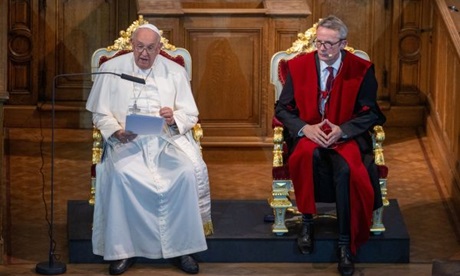During his visit to Belgium, Pope Francis was warmly received September 28 at the University of Louvain, which was celebrating its 600th anniversary. And yet, the event left a bitter aftertaste.
Confronted by a group of students and faculty over “the invisibility of women” in his encyclical Laudato si’, “Christian ecofeminism,” and the role of women in the Church, Francis was challenged as rarely before, especially from the left.
The Pope tried to rise above it, displaying his usual warmth, simplicity, and good humour.
But no sooner had he stepped off the stage than the university’s president issued a statement expressing “her incomprehension and disapproval of the position on women’s role in the Church and society.”
So what exactly did the Pope say that was so shocking? In truth, not much. For Francis, “a woman is a daughter, sister, mother. Just as I am a son, brother, father.”
It’s a broad enough definition for everyone to find their place.
He reminded the audience that “it’s relationships that express our being in the image of God, men and women together, not separately.” This is essentially a paraphrase of Genesis.
He emphasised that “women and men are persons, not individuals” and that they are “called to love and to be loved.”
In short, it was a sermon in clichés.
However, the Pope may not fully grasp how deeply our culture believes that each person defines their own origin, purpose, and standards.
Contrary to what he preaches and hopes for, the individual has overtaken the concept of the person.
Those who advocate for intersectional struggles may agree with his notion that “everything is connected”—racism, sexism, poverty, the ecological crisis – but they cannot accept that men and women should be defined by their relationships with one another.
A society where gender issues are increasingly central
So, what’s the solution to this disconnect?
There are two possible paths—two dead ends, really. One option is to double down on appeasement, which only accelerates the very secularisation the Church seeks to prevent.
A soft Catholicism is a silent Catholicism. It will always be criticised for something until it becomes nothing at all—and even after that.
The other option, retreating into a defensive identity, leads to a different kind of marginalisation. The Church would become a small, pious society, a sect as closed off as it is esoteric, muttering truths that only make sense within its own bubble.
In the history of Christianity, one thing has remained constant over 2,000 years: there’s no mission without witness, but no evangelisation without cultural engagement.
While the faith should never be watered down, the language of the times must always be taken seriously.
A Pope can no longer assert, as Francis did somewhat nonchalantly, that:
“women are more important than men, but it’s ugly when a woman wants to be like a man” or that “women are about fruitful acceptance, care, vital devotion,” or that “the Church is a woman,” or even that “women are at the heart of the salvation event,” citing Mary.
These clichés do not address the fundamental questions of younger generations.
In a society where gender issues are increasingly central and where male dominance over women is being questioned everywhere, the incident in Louvain should serve as a wake-up call.
Thinking about women the way St. John Paul II did is no longer possible; we must now think with women.
The Magisterium must listen, and theology must humbly return to the drawing board.
- Jean-Pierre Denis, a veteran journalist and editor, is the publisher of La Croix International.
- Article first published in La Croix
News category: Analysis and Comment.




